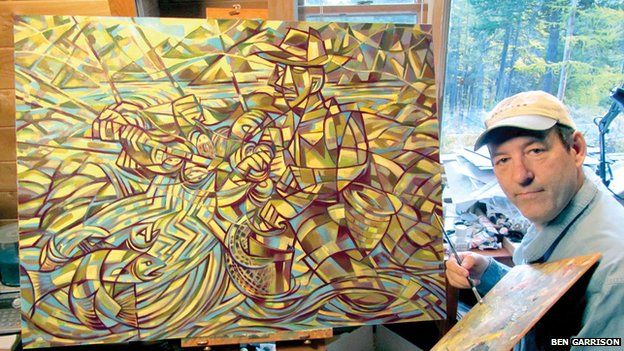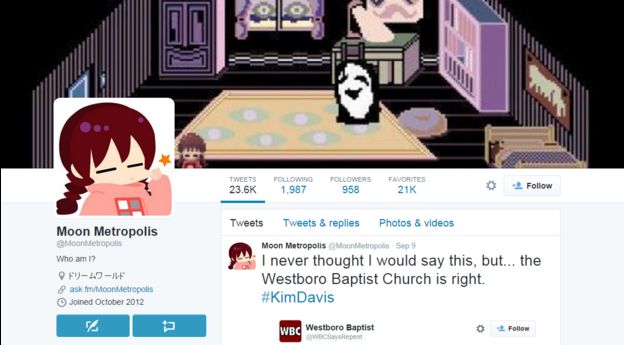Wendling, Mike “Neo-Nazi, radical feminist and violent jihadist – all at once“, September 21, 2015, BBC News http://www.bbc.com/news/blogs-trending-34292809
To some he was an Islamist extremist, to others a radical feminist, to others a neo-Nazi. These are all online identities that seem to have belonged to Joshua Goldberg – but in reality he was none of these things.
They were simply online aliases used to whip up ideological hatred, with seemingly dangerous and even violent real-world consequences. In reality he lives in Florida, spent huge amounts of time online – and has now been arrested by the Federal Bureau of Investigation (FBI).
But if the allegations now being made against him are true, posing under these fake identities, he seems to have incited others to act abusively and in some cases, to take up arms.
Among the alleged victims was Ben Garrison, an artist living in Montana. Around the time of the 2008 financial crisis he started drawing libertarian-themed political cartoons, lamenting what he saw as the rise of “big government.” But he soon found that his work was attracting people he vehemently disagreed with – who seemed to be extremists and white supremacists.
“There was a page on Facebook using my photographs, and all my cartoons, but they were all vandalised with hate and anti-Semitism,” he told BBC Trending radio. Fake accounts set up in Garrison’s name posted racist messages, and his family was targeted as well. “When I went on there and saw what they were doing I was just abhorred.”
 Image copyrightBen Garrison
Image copyrightBen GarrisonThe lies about Garrison online spread out of control – a Google search of his name brings up pages of lies and misinformation, and his work as a commercial artist has dried up.
The abuse led him to hire investigators from the Online Hate Prevention Institute who looked into the white supremacists spreading the hate against him online.
And this is what they found: one of the key puppet masters who was rallying the extremists to bully Ben Garrison seemed to be a 20-year-old man living in his parents’ house in Florida. His name was Joshua Goldberg.
Garland attacks
It seems Goldberg wasn’t just posing as a racist neo-Nazi. Earlier this year an Australian journalist, Elise Potaka, discovered that someone was impersonating her, and one of her sources, online. Potaka enlisted the help of another journalist,Luke McMahon, and together they started chatting with Goldberg’s online personalities.
“It was immediately apparent to me that I was dealing with like a classic Internet troll, but one that was obviously quite sophisticated,” McMahon says. “When I first started engaging with him… I thought I was dealing with a member of the far right. But as the conversation progressed and I worked out this wasn’t about any kind of ideological crusade, but it was something much different.”
One of Goldberg’s alleged identities was called “Australi Witness” – a persona that claimed to be a supporter of the the so-called Islamic State, living in Australia. Improbably, “Australi Witness” also claimed to have worked for human rights organisations and to have links with liberal Muslim human rights activists.
Australi Witness took online abuse even further than other aliases attributed to Goldberg, stoking up Islamic extremists and encouraging real-world violence. After two men were shot dead attacking a controversial “draw Muhammed” contest in Garland, Texas in May, it emerged that they had retweeted messages from the Australi Witness Twitter account.
Goldberg hasn’t been arrested or charged in connection with the attempted Garland attack, but the Australi Witness persona started to claim credit for it. And his statements started to get the attention of the FBI. Reality was about to descend.
 Image copyrightTwitter
Image copyrightTwitter‘Socially isolated’
The footprint of these fake aliases is spread all over the internet. In late August, we here at the BBC Trending blog got an email from Australi Witness. “You might know me for inspiring the attack in Garland, Texas earlier this year,” it read. “I would like you to know that, on September 11, a pressure cooker bomb is going to be detonated in a large Midwestern US city.”
The message contained ridiculous claims and unbelievable boasts – but was forwarded to the police regardless.
It turned out that according to an affidavit filed by the FBI, Goldberg, posing as Australi Witness, had been making similar claims to an FBI informant posing as an Islamist militant – and going much further by providing the informant with detailed information about how to build a bomb.
When he was arrested, the affidavit says, Goldberg admitted being behind the fake identity, but claimed he was hoping the Islamist militant he thought he was talking to would blow himself up in the process of building the bomb. Failing that, Goldberg told authorities, he would call police at the last minute, stop the attack, and be hailed as a hero.
Goldberg’s lawyer, Paul Shorstein, says the arrest came as a shock to the rest of his family, and that his client is currently receiving care for mental health issues.
Local news reports say neighbours rarely if ever saw him outside – some didn’t even know he was living in his parents’ house.
“He was a very socially isolated individual,” says Luke McMahon, the journalist who chatted with him for months online. “He was someone who found refuge on the Internet and established connections with a community that he wasn’t able to develop in the real world. Unfortunately that community that he became involved with is a very negative and destructive community.”
Political motivation?
So why did a young man take on all of these cloaks and identities? Potaka and McMahon say that if Joshua Goldberg did have an ideology, it was one based on an extreme interpretation of the idea of free speech. But his aliases were so many and so contradictory that it’s difficult to tell what he really believed, or even if online essays published under his own name really represent his views.
Goldberg has been arrested, on suspicion of terrorism offences, but hasn’t yet been indicted. He is currently undergoing an evaluation to see if he is mentally fit to stand trial.
“I’d often look at the weather in Florida … and it’s like fantastic weather in Florida and I’m sitting here in freezing cold Melbourne,” McMahon says. “I said to him, ‘Why don’t you go outside? Like why don’t you go to the beach?’ And he’d tell me these sort of intimate things about himself like you the fact that he does suffer from depression and that he doesn’t leave the house. I think it’s really difficult to not empathise with someone who’s in that situation.”
But others disagree – like Ben Garrison, the cartoonist on the receiving end of all that abuse.
“People will probably say ‘You have to feel sorry for him, he’s mentally ill,’” Garrison says. “No. Not after what I’ve gone through. Five years of harassment from this guy. I want revenge at this point. I’m happy he’s been arrested.”
